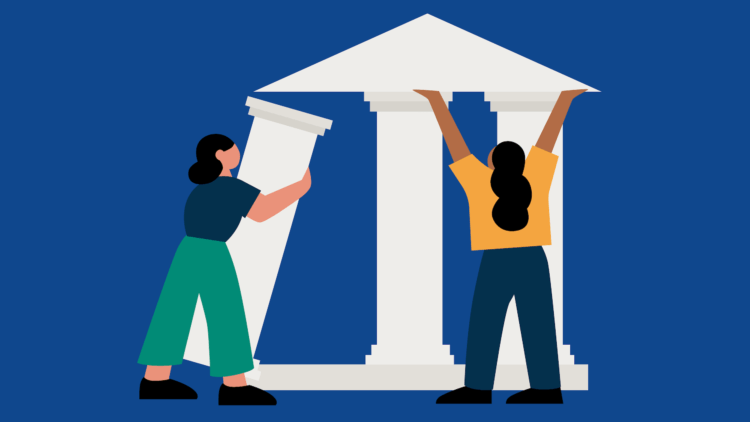Success in the legal profession is a moving target that expands with time, experience, and proper guidance. By learning from a legal mentor who has already tread the path you’re on, you can streamline and strengthen your personal and professional development as a lawyer.
But who can benefit from having a legal mentor? In short: everyone.
Whether you’re a law student, recent graduate, or attorney with decades of experience, you can benefit from a legal mentor. There’s always more to learn and someone with more experience or a different perspective—so finding a legal mentor is a valuable opportunity for all lawyers.
In the following post, we’ll cover what you need to know about legal mentors. We’ll share tips on how you can find a legal mentor, what questions to ask them, and how to establish a positive and respectful relationship. In addition, you’ll learn the essentials to make legal mentorship an ongoing tool in your legal career.
What is a legal mentor?
A legal mentor is an experienced lawyer who passes their guidance, experience, and advice to another attorney, law student, or legal professional. With the help of a mentor, a legal professional can learn new skills, set better goals, and build confidence in their career. A mentor can work with a mentee one-on-one or in a group setting. In addition, the goal of a legal mentorship is to create a relationship where a more experienced lawyer can convey real-world wisdom and support—so the mentee can learn and grow.
Discourse is the heart of a legal mentorship, and the discussion can occur by meeting in person, talking on the phone, or via email correspondence.
Legal professionals can arrange mentorships formally via a legal association or organically through networking.
Why do you need a legal mentor?

Legal professionals can benefit from a legal mentor providing industry and career-specific guidance from an experienced and external perspective.
Regardless of where you are in your legal career, there’s always someone with more experience and a different and valuable perspective from your own—who you can learn from.
As a law student or new attorney, having a legal mentor is a great way to have an established lawyer show you the ropes. Unfortunately, most lawyers aren’t taught many important lessons in law school. That’s why a mentor who can help you set career goals, search for a job, and prepare you for proper work-life balance, networking, and the business side of law can help start you on the right foot. A legal mentor like Neal Katyal could even help you improve your legal arguments, for example.
For attorneys who have already established a solid foundation in their legal careers, a legal mentor can offer perspective and advice on advancing to the next level.
More experienced lawyers can benefit from having a legal mentor who is established in an area that they want to move forward in. For example, an attorney who has been working successfully for a firm for 10 or 15 years wouldn’t need the same type of mentorship as a first-year lawyer. But experienced lawyers may be thinking about starting their own law firm. In this case, a legal mentor who’s starting their own firm would have unique experience and advice that could be invaluable.
You may like these posts
Where you can find a legal mentor
Where you find a legal mentor depends largely on what point you’re at in your legal career. This is because the type of mentor you need differs when you’re starting vs. when you’re 10 or 20 years into your career. Consider the following:
If you’re a student
The most advantageous places for law students to look for a legal mentor are often within their existing networks and affiliations. You’re likely already connected to people and programs that can help you find the right match. Look to:
- Clubs. Law-related student clubs and organizations may work with potential mentors.
- Law school resources. Check if your law school has any formal programs to help facilitate mentorship opportunities with legal professionals or upper-class students.
- Law school faculty. Professors and faculty members may become mentors, or they may be able to help connect you with an appropriate mentor.
- Internships. Check if there’s a formal internship program or if you can find a mentor while interning.
If you’re a professional
Once you’re an established lawyer, you’ll rely less on educational connections and look more to your professional community, such as:
- Legal communities. Getting involved with legal communities and online lawyer forums is a great way to build connections. You can also potentially find a mentor within the legal community. For example, The Law Community—Clio’s online network for legal professionals—gives Clio customers virtual space to connect, learn, and support each other.
- Bar associations. Check if your local bar association has a program for mentorship.
- Social media groups. Social media isn’t just for fun on your personal time. Lawyers can use social media as a professional tool. Specifically, lawyers can use social media for networking to connect with potential mentors in the legal community. Check legal-specific groups on platforms like Slack, LinkedIn, and Facebook.
- Networking events. Networking is an important tool for lawyers. In addition, networking is an excellent way to expand your professional network to other legal professionals who could be potential mentors.
- Your law firm. Is there a formal mentorship program at your firm? If so, take advantage of it. Alternatively, you could ask a more senior attorney at your firm if they’d be open to mentoring you.
- Legal mentoring associations. Dedicated legal mentoring associations like the National Legal Mentoring Consortium (NLMC) offer resources for legal professionals looking to implement mentorships. For example, on the NLMC’s website, you can find helpful mentorship-related news and resources, as well as links to mentorship programs for legal professionals organized by state, local, law firm, ethics-based, and other specific areas of interest.
If you’re a firm owner
Law firm owners juggle multiple areas of professional development as they strive for success in the legal industry—and as a business owner. Law firm owners can find mentors through:
- Associations. Check professional associations related to the legal industry (such as local bar associations) and business (such as small business associations) for mentorship opportunities.
- Former colleagues. Previous bosses or colleagues who run their own firms can be a good source for mentorship.
- Networking events. If you’re a law firm owner, you may already be the most experienced person at your firm. That’s why networking events are essential for meeting potential mentors with varied experiences to learn from.
- Social media groups. Just as with legal professionals, law firm owners can use social media. Social media platforms include Slack, LinkedIn, and Facebook solo practitioner groups. This way, lawyers can tap into their local legal community to find mentor opportunities.
- Legal mentoring associations. Dedicated legal mentoring associations like NLMC can also be helpful for law firm owners seeking a mentor.
How to structure your mentor-mentee relationship

Once you’ve found the right fit, you need to consider what questions to ask a lawyer mentor and establish goals for your mentorship. It’s essential to think about these factors from the start. This way, you can maximize your experience without wasting your mentor’s valuable time. Keep the following three guidelines in mind to help promote a positive, productive mentor-mentee relationship:
Ask questions
Time is valuable, so avoid asking questions that you could easily find the answers to by Googling. For example, you can often find basic biographical facts about potential mentors on their law firm website. Instead, think of questions to ask a lawyer mentor that focus on their lived experiences, opinions, and advice. For example:
- How would you describe your career journey?
- Can you recommend any books to read? Do you listen to any legal podcasts that you think could be beneficial?
- Do you recommend any associations for me to join? Have you had any noteworthy experiences that came from associations?
- Are there any lawyer training courses you can recommend?
Set a goal
Both you and your mentor can establish a more productive relationship if you enter your time together with a clear goal for what you hope to achieve from the mentorship.
To help structure and focus your sessions with your mentor, you should know the answer to the following questions before your first meeting:
- What do you want to get out of this mentorship?
- What professional goals do you want to achieve?
- What personal goals do you want to achieve?
For more on lawyer goal-setting, read our guide to setting lawyer goals.
Be respectful
If someone is taking time out of their busy day to mentor you, you must be respectful of their time and energy. Follow these tips:
- Respect their time. Be reasonable with your requests for meetings and assistance. For example, if your mentor is willing to look over a resume or document for you, make sure you give them ample time to reply.
- Do your research. Do some background research on your mentor to have a general idea of their career path—this can help guide your discussion and bring up areas that you’re particularly interested in getting their insights.
- Take the lead. Be prepared to be in charge of making the mentorship work when it comes to scheduling. Since your mentor is giving their time, it’s your responsibility to make the process as seamless for them as possible. Don’t make them chase you to set up a time to meet.
A legal mentor can give you an advantage in your law career

Having a legal mentor is a valuable way to learn from the wisdom and experience of another lawyer. A legal mentor can also help you become a better, more successful lawyer. While mentors are a great choice for new lawyers and law students, they aren’t limited to new attorneys. Having many mentors throughout your career can give you a strategic advantage as you master specific areas of law or running your own firm.
Whatever stage you’re at in your career, look for a legal mentor who has experiences and perspectives from where you hope to be in the future. Beyond that, it’s also important to find a mentor with whom you have a positive rapport and can have productive discussions.
Once you’ve found a legal mentor, be sure to prepare, set goals, and have a clear vision for what you hope to achieve from the relationship.
While there’s much to gain from having a mentor, don’t forget about the importance of paying it forward. You can also become a mentor as you move throughout your career. By doing so, you can give back and carry on the cycle of lawyers handing down hard-earned knowledge and helping each other become the best versions of themselves.
We published this blog post in July 2021. Last updated: .
Categorized in: Uncategorized









